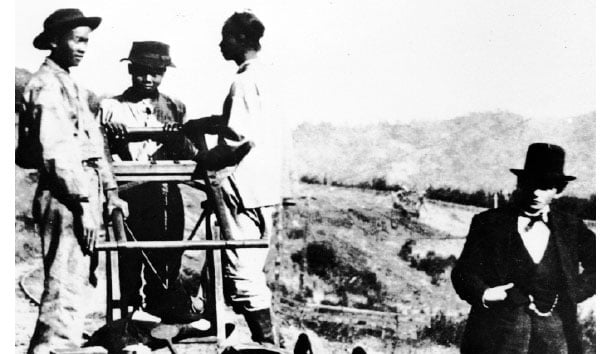Five years ago, the California state legislature voted to apologize to the Chinese for former laws that discriminated against them, including the federal government’s Chinese Exclusion Act of 1882, which California congressmen championed. The apology bill was sponsored by state assembly members Paul Fong and Kevin de León. Fong said he was not planning on demanding monetary compensation for “surviving victims” of the state and federal laws, but he wanted schoolchildren educated about the mistakes of the past. What passes for education on such issues in California, however, is a polemical inventory of half-truths and omissions.
In June, the California state senate passed a resolution calling on Congress to apologize formally for the Exclusion Act. Back in October 2011 the Senate passed a resolution expressing “regret” for enactment of the Exclusion Act, and in June 2012, the House followed suit, but state senator Bob Huff said, “An expression of ‘regret’ is different from an actual apology. Regret is ambiguous and may or may not imply guilt.” A conservative Republican, Huff was mayor of Diamond Bar before his election to the California senate. Diamond Bar is 53-percent Asian, mostly recent Chinese immigrants, and the current mayor is Ling-Ling Chang.
Unfortunately, almost no one calling for apologies on the state or national level seems to know anything about the Chinese Exclusion Act. In today’s political and cultural climate, it’s enough that the act is called racist. That means all further discussion, including attempts to put the act in historical context, is to be dismissed out of hand and, in the future, prohibited by law as “hate speech.” Don’t imagine the latter is far off. Our neighbor to the north, Canada, already has such laws.
Despite its name, the Chinese Exclusion Act excluded only Chinese laborers. Other classes of Chinese—travelers, merchants, teachers, students—were permitted entry. If the act had been purely a matter of racial discrimination, shouldn’t all Chinese have been excluded? Laborers were singled out for good reason: For more than 30 years before the passage of the act they had been undercutting the wages of the American workingman, especially in California. It took more than three decades to get such a restriction because big business in the Golden State and elsewhere welcomed the cheap labor.
Chinese laborers could work at wages that would impoverish an American. They were nearly all young men without families who came as sojourners to work for a decade or two, all the while living communally, and then return home. Few had any intention to stay here permanently. Most arrived as indentured servants bonded to Chinese merchants. Some came as contract laborers under the control of Chinese merchants. Others were kidnapped and sold into service, again to Chinese merchants. The Chinese called these slaves kuli, meaning those with “bitter strength.” Americans heard the term and, not knowing the distinctions among Chinese laborers, began calling them all coolies.
The Chinese merchants exercised near absolute control over the laborers, whether indentured servant, contract laborer, or kuli. They could do so because not only were the laborers intent on returning to China and averse to becoming Americanized, but Chinese secret societies acted as deadly enforcers. Victims of such enforcement were often hacked to death with meat cleavers, which served as a horrific warning to others. Since Chinese witnesses were hard to come by, and getting them to testify in court was even harder, American authorities could do little about the crimes.
The Central Pacific Railroad, later reorganized as the Southern Pacific, or any other large employer of labor in California, could contract with Chinese merchants for thousands of easily manageable, uncomplaining, low-wage laborers from China, costing American workers good pay and jobs. In boom times this had only a marginal effect, but during severe downturns, such as the mid-1850’s in California, and the years following the Panic of 1873, which affected the entire nation, the workingman in California was in a world of hurt.
Time and again attempts at limiting the immigration of Chinese laborers were crushed by powerful business interests, especially the Southern Pacific Railroad, which controlled the state legislature. Occasionally, it was difficult to distinguish the railroad from the state government. At one time Leland Stanford, president of the railroad, was also governor of California. He later was a U.S. senator from California. Conditions became so bad during the mid-1870’s, though, that a third political party rose in California to challenge both the Democrats and the Republicans. The Workingmen’s Party not only got many of its candidates elected to public office but got more of its candidates elected to the state constitutional convention of 1878 than either the Democrats or the Republicans.
The Workingmen’s Party was able to institute a number of reforms, including several aimed at restricting the employment of Chinese laborers. Big business immediately launched challenges in court. Meanwhile, the spectacular rise of the Workingmen’s Party in California was having an effect nationally, and the two major parties, after ignoring the problems in California since the early 1850’s, began talking of the need to halt the immigration of Chinese laborers. This came to fruition in the Exclusion Act of 1882, the consequence of a far more complex set of circumstances than a simple racial assault on the Chinese.

Leave a Reply